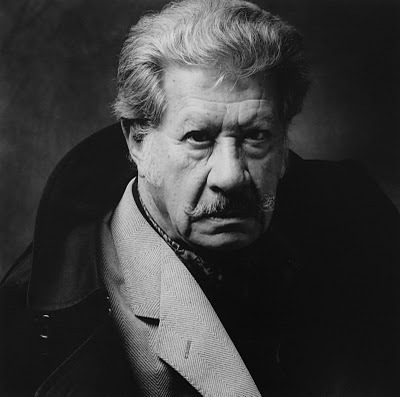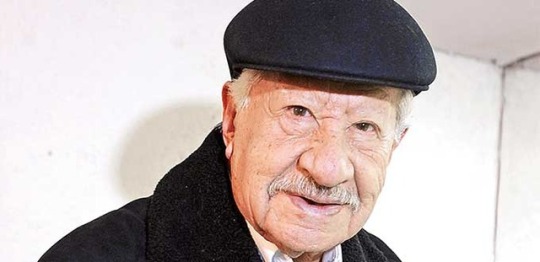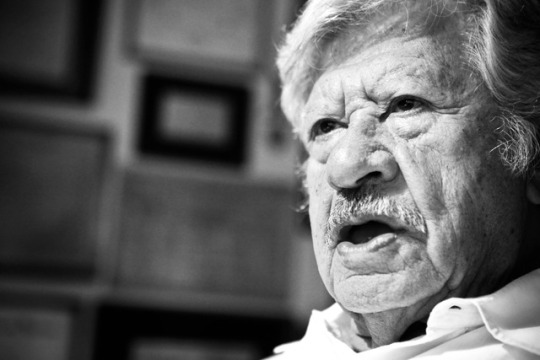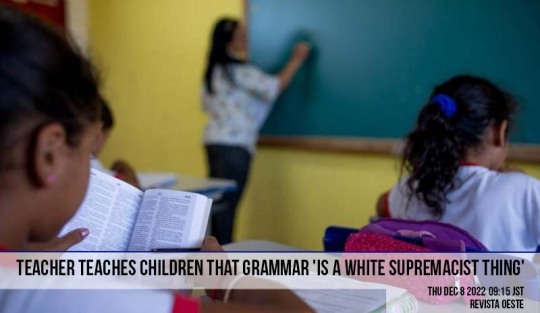#Marta Shaffer
Text
By: Luke Gentile
Published: Dec 7, 2022
A teacher in California who identifies as "cringey" is going viral after claiming she does not teach grammar usage and writing skills in an attempt to defeat white supremacy.
Marta Shaffer teaches English at Oroville High School and uses linguistics to fight "white supremacy in my classes" and be "inclusive of all kinds of ways we use the language," she said.
The expectation that students should use syntax and proper grammar is based in a deep-rooted white supremacy culture, she argues, according to a report.
"I try to undermine that B.S. in my classroom as much as I can," she said. "We study linguistics and the rules that we actually use to communicate instead of the made-up rules that white supremacy created for when we write papers and stuff, which is what scholars call the 'language of power.'"
"As an educator, I constantly worry if I'm the problem. What do I mean by that? Well, public education is an institution that upholds lots of problematic systems in our society like white supremacy and misogyny and colonization, etc.," she said. "Well, let's look at how we write essays [in which we] start with an introduction that includes a thesis, always cite your sources, use transition words like 'however' and 'therefore.' These are all made-up rules. They were created by Westerners in power. Which got me thinking, what if I started my school year with a unit honoring how we talk rather than teaching students how to write properly."
One example is a prompt in which Shaffer has students examine how they communicate at home.
"Just because your teachers, your professors, and your boss may expect you to write and speak in a certain way that may not be natural to you, does not mean that your more natural ... languages are not important," she said.
"They are just as important, if not more important, than the 'language of respectability.'"
Despite her efforts, Shaffer wants to make sure she does not become a "white savior."
"Did I worry I was being a white savior? Absolutely. Was it uncomfortable? Definitely, but a lot of my students come here, and they're uncomfortable with the white mainstream culture of public school life," she said.
"So I think it's good for them to see their teacher deal with linguistic discomfort, too."
==
When the inmates aren't just running the asylum, but society itself.
Reminder that K-12 teachers do not have academic freedom. They're government employees. They have no more freedom of expression in the performance of their job than Kim Davis has freedom of religion the performance of hers. Firing Shaffer is removing a dangerously unqualified employee, like removing a bus driver who doesn't have a license.
One could easily be convinced that Shaffer is a member of the KKK deliberately undermining students and particularly minorities, with her rhetoric of school being a white place, syntax and grammar being white things, writing skills being for white people. What better way to keep them in their place than by sabotaging their education? Marta Shaffer herself is a full-blown white supremacist. She's exactly that.
What's not mentioned in the article but stated in the video is that she didn't just come up with this on her own. She cites "Dr." April Baker-Bell's "Linguistic Justice," which has over 160 5-star reviews on Amazon.
https://en.wikipedia.org/wiki/April_Baker-Bell
April Baker-Bell is an American academic and the author of Linguistic Justice: Black Language, Literacy, Identity, and Pedagogy. She is the 2020 recipient of the Orwell Award from the National Council of Teachers of English.
She is a native of Detroit, Michigan, and is an associate professor in the English department of Michigan State University.
Baker-Bell's website proudly boasts that she's been featured on the BBC and in USA Today.
When a Muslim beats his wife, he knows he's doing the right thing because the quran says so. Marta Shaffer isn't just some random nutter; she has certainty that she's doing the right thing because the scripture says so. Which also means that there's even more Shaffers out there doing exactly the same thing with exactly the same certainty. We just haven't identified them yet.
#Marta Shaffer#April Baker Bell#Linguistic Justice#corruption of education#TikTok teachers#academic corruption#education#reading and writing#linguistic skills#language skills#grammar#syntax#white supremacy#woke activism#cult of woke#wokeism#woke#wokeness as religion#religion is a mental illness
16 notes
·
View notes
Link
0 notes
Link
Chapter: Storage Options: Making Decisions about Print Materials
Author: Frank Allen.
Book: Creating the High Functioning Library Space: Expert Advice from Librarians, Architects, and Designers.
Editor: Marta Deyrup.
Year: 2016.
Publisher: Libraries Unlimited ABC-CLIO, LLC.
Chapter: Liaison and Scholarly Communication Librarians Collaborating to Support Faculty and Students.
Authors: Sarah Norris, Sandy Avila, and Buenaventura (Ven) Basco.
Book: Approaches to Liaison Librarianship: Innovations in Organization and Engagement.
Editors: Robin Canuel and Chad Crichton.
Year: 2021.
Publisher: Association of College and Research Libraries.
Chapter: Creating a Sense of Place: Connecting Participants to Local Habitats through Library and Community Partner Collaborations.
Authors: Christina Wray, Sandy Avila, and Megan Haught.
Book: The Sustainable Library’s Cookbook.
Editors: Raymond Pun and Gary L. Shaffer.
Year: 2019.
Publisher: Association of College and Research Libraries.
Chapter: Disrupting the Model: Fostering Cultural Change through Academic Partnerships
Authors: Aimee deNoyelles, John Raible, Penny Beile, and Sarah Norris.
Book: Textbooks and Academic Libraries: Selection, Circulation, and Assessment (An ALCTS Monograph).
Editor: Chris Diaz.
Year: 2017.
Publisher: ALA Editions.
Chapter: Content Analysis: Deconstructing Intellectual Packages.
Authors: Penny Beile.
Book: Using Qualitative Methods in Action Research.
Editors: Doug Cook and Lesley Farmer.
Year: 2011.
Publisher: Association of College and Research Libraries.
Chapter: Assessing an Institution-wide Information Fluency Program: Commitment, Plan, and Purposes.
Authors: Penny Beile.
Book: The Teaching Library: Approaches to Assessing Information Literacy Instruction.
Editor: Scott Walter.
Year: 2007.
Publisher: Haworth (now Routledge).
Chapter: The Development and Use of the Education Library 56 Tutorial: A Web-based Tutorial for Preservice Teachers.
Authors: Penny Beile.
Book: Digital Resources and Education Libraries: Innovation, Invention, and Implementation.
Editor: Patricia O’Brien Libutti.
Year: 2004.
Publisher: Association of College and Research Libraries.
Chapter: Exploring UN SDG Target Goals through a Research Poster Project.
Authors: Nardia Cumberbatch.
Book: The Sustainable Library’s Cookbook.
Editors: Raymond Pun and Gary L. Shaffer.
Year: 2019.
Publisher: Association of College and Research Libraries.
Chapter: From Birth to Maturity: The Chinese American Librarians Association.
Authors: Sai Deng.
Book: Asian American and Libraries: Activism, Collaborations, and Strategies.
Editors: Janet Hyunju Clarke, Raymond Pun, and Monnee Tong.
Year: 2017.
Publisher: Rowman & Littlefield.
Chapter: Redefining Scholarly Services in a Research Lifecycle.
Authors: Sai Deng and Lee Dotson.
Book: Creating Research Infrastructures in the 21st-Century Academic Library: Conceiving, Funding, and Building New Facilities and Staff.
Editor: Bradford Lee Eden.
Year: 2015.
Publisher: Rowman and Littlefield.
Chapter: Information Representation
Authors: H. Cui, Sai Deng, and X. Y. Tang.
Book: Research Fronts in the Humanities & Social Sciences in the West.
Editors: Heting Chu and Yin Zhang.
Year: 2007.
Publisher: Renmin University Press.
Chapter: Picturing the Past and Planning for the Future: Central Florida Memory.
Authors: Lee Dotson and Selma Jaskowski.
Book: Digitization in the Real World: Lessons Learned from Small to Medium-sized Digitization Projects.
Editors: Kwong Bor Ng and Jason Kucsma.
Year: 2010.
Publisher: Metropolitan New York Library Council.
Chapter: Humanities in the Open: The Challenges of Creating an Open Literature Anthology.
Authors: Christian Beck, Lily Dubach, Sarah Norris, and John Venecek.
Book: Open Pedagogy Approaches: Faculty, Library, and Student Collaborations.
Editors: Kimberly Davies Hoffman and Alexis Clifton.
Year: 2020.
Publisher: Rebus Community / Milne Publishing.
Chapter: Why Every Librarian Should Know About Copyright: Creating Copyright Training Opportunities for Librarians at Your Institution.
Authors: Sarah Norris, Barbara Tierney, and Lily Dubach.
Book: Copyright Conversations: Rights Literacy in a Digital World.
Editor: Sara Benson.
Year: 2019.
Publisher: Association of College & Research Libraries.
Chapter: Call of Cthulhu: Hosting Roleplaying Events in the World of H.P. Lovecraft.
Author: Michael Furlong.
Book: 52 Ready-To-Use Gaming Programs for Libraries.
Editor: Ellyssa Kroski.
Year: 2020.
Publisher: American Library Association.
Chapter: Unraveling Julian Karswell’s Runic Curse in Jacques Tourneur’s Night of the Demon.
Authors: Michael Furlong.
Book: Terrifying Texts: Essays on Books of Good and Evil in Horror Cinema.
Editors: Cynthia Miller and Bow Van Riper.
Year: 2018.
Publisher: McFarland.
Chapter: Gendered Power: Comics, Film, and Sexuality in the United States.
Authors: Michael Furlong.
Book: Ages of Heroes, Eras of Men.
Editors: Julian Chambliss, Thomas Donaldson, and William Svitavsky.
Year: 2013.
Publisher: Cambridge Scholars Publishing.
Chapter: Improving Circulation Services through Staff Involvement.
Authors: Cynthia Kisby and Marcus Kilman.
Book: Best Practices in Access Services.
Editors: Lori L. Driscoll and W. Bede Mitchell.
Year: 2009.
Publisher: Routledge.
Chapter: Formalizing Staff Development from Inception to Implementation at University of Central Florida Libraries.
Authors: Cynthia Kisby and Suzanne Holler.
Book: An Introduction to Staff Development in Academic Libraries.
Editor: Elizabeth Connor.
Year: 2009.
Publisher: Routledge.
Chapter: Preserving Your Community’s Memories: Developing Librarians for Digital Preservation.
Authors: Vanessa Neblett and Shane Roopnarine.
Book: Creative management of small public libraries in the 21st century.
Editor: Carol Smallwood.
Year: 2014.
Publisher: Rowman & Littlefield.
We hope you enjoyed reading about book chapters from our library faculty and staff. This is the second post in a series of library employee author spotlights. Our first post features books written, edited, and translated by us. For questions, please reach out to Lily Dubach.
2 notes
·
View notes
Note
arwen!!! congrats on your milestone!!!! can i have a 💥 + ✨ please?
tysm elke ily!!!
💥:
tony | steve | thor | bruce | nat | clint
quill | gamora | drax | rocket | groot | nebula
peggy | jarvis | daniel | angie | dottie | howard
coulson | daisy | may | jemma | fitz | mack | yoyo
avengers | shield | sword | ssr | guardians | revengers
tony’s suit | cap’s shield | mjolnir | infinity gauntlet
mind | space | power | reality | time | soul
new york | san francisco | westview | wakanda | asgard | xandar
✨:
book rec: the guernsey literary and potato peel pie society by mary ann shaffer and annie barrows!
film rec: emma (2020)!
song rec: “all i do is dream of you” by dodie!
what fictional character you remind me of: marta cabrera!
what absolutely batshit episode of doctor who you remind me of: new earth. it’s possibly the most batshit episode of the entire show, which is saying something, so i’ve just linked the wikipedia page for you to read the summary. cat nuns, possession, and giant disembodied heads are involved
my fave of your recent creations (if you create):
blog compliment: everything about you is just so wonderfully calming? i don’t know if it’s your gorgeous theme or the fact that you’re such a sweet person but you just seem like you would give the best hugs. also, caro emerald stans unite XD
join my celebration!!!
2 notes
·
View notes
Photo





Ignacio López Tarso (born Ignacio López López on January 15, 1925 in Mexico City, Mexico) is a Mexican actor of stage, film and television. He has acted in about 50 films and appeared in documentaries and in one short feature. In 1973 he was given the Ariel Award for Best Actor for Rosa Blanca, and the Ariel de Oro lifetime achievement award in 2007
López was born in Mexico City to parents Alfonso López Bermúdez and Ignacia López Herrera. Because of his father's job, he spent his childhood among several cities including Veracruz, Hermosillo, Navojoa and Guadalajara. His siblings are Alfonso and Marta. At around age 8-9, when he was in Guadalajara, his parents took him to see a play, where he became interested in acting.
He lived in Valle de Bravo, Estado de México, where he went to secondary school. Although his family's economic problems kept him from attending high school, he joined seminaries in Temascalcingo, Estado de México and Mexico City to continue his education. During his time there, a visiting priest from the United States organized a group to perform plays, in which he participated. He learned to read oral poetry and books of classical plays, including those by Lope de Vega and Calderón de la Barca.
When he was 20, he joined the military service at Querétaro, where he was in barracks for about a year. He also served in the Veracruz and Monterrey regiments, and eventually reached First Sergeant grade. After completing his service, he declined an opportunity to attend military school, even though he liked the discipline.
He worked in Mexico City as a sales agent for a clothing company. He aspired to work in the United States, and planned to work at an orange grove in Merced, California. However, a few days in, he fell from a tree and injured his vertebrate. He returned to Mexico City for rehabilitation therapy which lasted about a year.
While López was in therapy, he read books on poetry and theatre, and became a fan of author Xavier Villaurrutia. After his recovery, he heard that Villaurrutia was teaching theatre at the Palacio de Bellas Artes, so he visited him, initially to ask for his autograph, but then was invited to listen in on his lessons. After a few days, he formally joined the theatre academy at age 24. When Villaurrtia advised Lopez to pick a stage name, he changed from "López López" to "López Tarso", the Tarso was Spanish for Paul the Apostle's hometown of Tarsus, and also one of the cities in Mexico that Lopez had also once lived. Besides Villaurrutia, he studied under other masters such as Salvador Novo, Clementina Otero, Celestino Gorostiza, André Moreau, Seki Sano, Fernando Wagner and Fernando Torre Lapham.
López Tarso's professional stage debut was in 1951 for the play Born Yesterday by Garson Kanin. He would also perform in several William Shakespeare plays such as A Midsummer Night's Dream, Macbeth, Othello and King Lear. Other productions included: The Crucible by Arthur Miller, Oedipus Rex and Oedipus at Colonus by Sophocles, Hippolytus by Euripides, La Celestina by Fernando de Rojas, Cyrano de Bergerac by Edmond Rostand, The Miser by Molière, El villano en su rincón by Lope de Vega, The Mayor of Zalamea by Calderón de la Barca, and Exit the king by Eugène Ionesco. "Equus" by Peter Shaffer. He also performed works from authors Sor Juana Inés de la Cruz, Miguel de Cervantes, Guillén de Castro, Hugo Argüelles, Emilio Carballido, Ramón María del Valle-Inclán, over a hundred productions throughout his career.
Ignacio López Tarso's theatrical work has been mostly performing in drama, though in the years 2014 and 2015 he starred in a two-person comedy written by Carlos Gorostiza and titled Aeroplanos ("Airplanes"); his performance on stage was presented with Sergio Corona who alternated appearances with Manuel "Loco" Valdés. The play was presented at the Teatro Independencia in Mexico City.
López Tarso's film debut was in 1954 where he played a minor character in La desconocida, which was directed by Chano Urueta.
He played the title character Macario, a supernatural drama directed by Roberto Gavaldón set in the Day of the Dead. The film was entered into the 1960 Cannes Film Festival.[1] and was the first Mexican film to be nominated for an Academy Award for Best Foreign Language Film in 1961.[2] He himself won a Golden Gate Award for Best Actor at the San Francisco International Film Festival in 1960, and would win another for his work in the 1963 film The Paper Man, directed by Ismael Rodríguez.
In 1961, López Tarso starred in Rosa Blanca, directed by Gavaldon. Because the film was censured by political interests of the time, it was not released until 1972. He won the Ariel Award for Best Actor in 1973. Other notable movie performances included: Cri Cri, el grillito cantor (1963), directed by Tito Davison; La vida inútil de Pito Pérez (1969), directed by Gavaldón; The prophet Mimi (1972), directed by José Estrada; Rapiña (1973), directed by Carlos Enrique Taboada; and The bricklayers (1976), directed by Jorge Fons.
As part of the Golden Age of Mexican cinema, López Tarso has acted in over fifty films, sharing star roles with actors such as Dolores del Río, María Félix, Marga López, Carlos López Moctezuma, Elsa Aguirre, Luis Aguilar, Katy Jurado, Irasema Dilián, Pedro Armendáriz and Emilio el indio Fernández.
Besides film, López Tarso has appeared in over twenty television series, and has released eight albums, many of which he recites poems and corridos about the Mexican Revolution. At one time, he served as a politician and became a federal deputy. He also had jobs in various organizations and trade-unions related to the actor and cinematographic associations.
77 notes
·
View notes
Text
Professora ensina a crianças que gramática ‘é coisa’ de supremacia branca
Professora ensina a crianças que gramática ‘é coisa’ de supremacia branca
Professora ensina a crianças que gramática ‘é coisa’ de supremacia branca
Em um vídeo publicado no TikTok, a professora de inglês Marta Shaffer, da escola pública de Oroville, na Califórnia, admitiu que ensina a seus alunos pequenos que “gramática é coisa de supremacia branca”. Conforme a educadora, as normas que regem a língua são uma “invenção ocidental”.
Segundo ela, os estudantes “perdem…

View On WordPress
0 notes